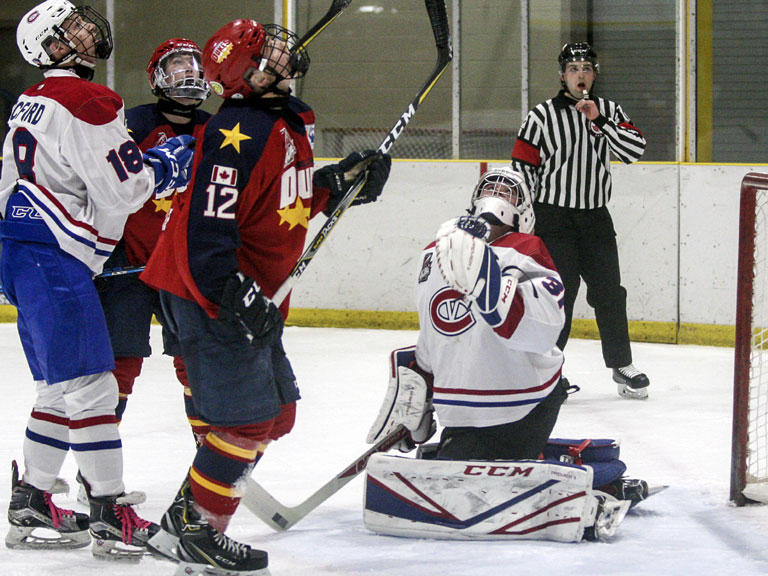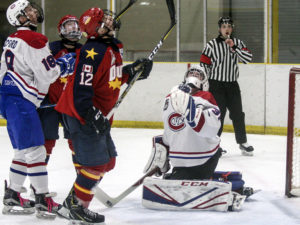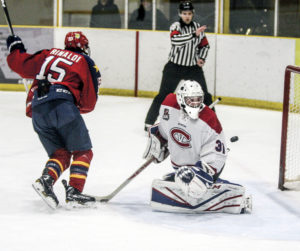Uncategorised
Unstructured


Daniel Panetta (12) looks skyward in anticipation of where the puck will land, in the Dukes’ 11-5 thumping of Kingston on Friday night.
Giveaways and flimsy play in their own zone cost the Dukes another two losses
Too many unforced errors. Too many exit passes that never leave the Wellington end. Too many giveaways. Not enough goaltending.
Even counting their lone win in three games, this was the story of the Dukes’ weekend.
Fourteen goals scored against—in three games. An average of 4.6 games allowed per game.
It does not matter how good your team is on offense—and this team is good—when you give up the puck repeatedly in your own end, you lose more than you win.
Defensive structure seems to have evaporated. From the young players perspective, it is certainly much more fun to play run and gun hockey—using your skills to dazzle, to race up the ice with the puck, to bob and weave, make a slick pass, and to fire a bullet just under the bar. But if that is your entire focus, you’re likely missing the terrible things happening in your own end. Worse, you think it has nothing to do with you.
So as defensive hockey becomes a distant memory, bad habits start to take on a permanancy. All it takes is an occasional success to suggest the problem lies elsewhere.
Sunday’s match served up perhaps the best— or is it worst—example. By the early going of the second period the Dukes had spotted the Lindsay Muskies a 5-1 lead. Lindsay isn’t a strong team. They haven’t been good for a long time. This season seems no different. The Muskies had won just three of 12 previous games coming into this game.
But here they were in Wellington, in front of an increasingly disenchanted Dukes crowd, with a four-goal lead. Most of the Lindsay goals were of the smelly variety. Pucks that trickled through the Duke netminder on shots that should never have found the back of the net. Still, too many of these were the result of gifts—pucks handed over without a contest.
But then Wellington’s firepower found some ice and some intensity on the forecheck. Ben Woodhouse scored. Then a Lindsay power play. The Dukes were once again obliging—giving up eight shorthanded goals on this afternoon. In the third, the Dukes turned it up a bit more.
Dan Panetta set up Jacob Vreugdenhil (on strong corner work by Dawson Ellis) and then Elijah Gonsalves. Suddenly the Dukes were within two goals of tying the game. With just over two minutes left in the game, the Dukes’ coach pulled netminder (by now Dannick Francoeur in his second stint in the game), in favour of an extra attacker. Rinaldi scored to draw the Dukes to within a goal. With all the momentum and adrenaline, the Dukes came very close to tying the game. But they fell short.
As a Dukes supporter, it might have been worse for this team had they tied and won the game in overtime. Such an outcome risked reinforcing the notion that the other team could run up the score—that our offence has the power to overcome. And, isn’t this more fun? Coming from behind? Heroes?
Worse, it fuels the notion that the problem was on one side of the ice—that it has nothing to do with the offense.

Andrew Rinaldi rips a penalty shot goal past the Kingston netminder late in the second period, extending the Dukes lead to 6-4. They would win this game by a much wider margin.
DUKES 11 – KINGSTON 5
Friday’s win against the Kingston Voyageurs—though a lopsided win—arguably set up the Dukes’ next two losses. Kingston skated out to a 4-2 lead early in the second. For the third Friday in a row, the opposing team scored within the first two minutes of the game.
But suddenly, against withering resistance, Wellington erupted with eight unanswered goals. The Dukes hammered the visiting wayward Voyageurs 11-5. A wide margin. A solid thumping.
Yet a poor message. They could play poorly for a period—yet lean on their offensive firepower to recover. It worked. It nearly worked again on Sunday.
Hardly a game plan, however.
DUKES 3 – TORONTO PATRIOTS 4
On Saturday the Dukes were on the road to Downsview. Wellington had opened up a twogoal lead—from Gonsalves and Adam Usinger. Now, in such a circumstance, one tactic might call for tightening up defensively. One man high. Everybody mindful of their defensive assignments. No stickhandling out of your own end. No heroics. Simple hockey.
But this isn’t what the Dukes had in mind in Toronto. Instead they allowed the Toronto Patriots to score three unanswered goals in six minutes. The Dukes’ lead had vanished, and they were suddenly trailing. Ellis managed to tie the game midway through the second period. But then the Dukes’ offense fizzled—managing just five shots in the third period.
Toronto took back the lead, 30 seconds into the final period. Then the Patriots shut down the neutral zone, turning the Dukes back time and again. Nothing doing. The Dukes lost 4-3.
So the Dukes are playing as a .500 team—if anything, this statistic may overstate the current competitiveness of the team.
Yet, there is still time. It is still October. Bad habits can be worked out. Personal ambitions may still be channelled into team play. But it begins by understanding that this track isn’t working.
UP NEXT: TRENTON, LINDSAY AND COBOURG
The Dukes spend next weekend on the road. On Friday they visit the Trenton. The Goldenhawks are struggling to find consistency in their game this season. Though, after 16 games Trenton has a better (.594) winning percentage than do the Dukes.
Trenton is a disciplined team, with the second fewest penalty minutes—but they also feature a stingy penalty killing capability—denying a power play goal in better than 90 percent of the opportunities their opponents have the man advantage.
On Sunday, the Dukes visit Lindsay. With Sunday’s loss on their minds, the Dukes should be motivated to rebound strongly.
And then on Monday, the Dukes head to Cobourg to take on the Division leaders. Wellington has one win, Cobourg another in the two games these squads have played this season.
But it really comes down to this. The Dukes must find their defensive game—a team game, and a return to tenacious checking in both ends of the rink—or this slide will continue.
This weekend provides an important test.

Comments (0)